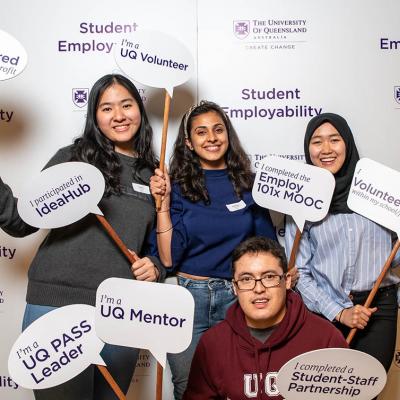If you’re under the impression that learning a second language is something only businesspeople do to land big deals and schmooze international clients, think again.
Speaking multiple languages is highly valued in a massive range of industries, from healthcare to tourism, arts to infrastructure. So, why is it good to learn another language alongside your studies at university? Because it can open up more job opportunities in Australia and overseas.
The good news is, you don't have to be an international studies student to learn a second language at UQ and enjoy the increased career outcomes bilingual communication skills can offer. You can study a Diploma in Languages alongside your bachelor's degree and boost your employability while you're still at uni.
If you're wondering 'does being bilingual help you get a job?', read on to discover the skills developed by graduates who learn a second language, and why employers value them.
How does being bilingual help your career?
1. Speaking a second language helps build relationships
Just as the fine art of networking is integral to business, so is making meaningful connections with clients, patients, customers and co-workers. Knowing another language can help you build relationships with people from other cultures in the workplace and beyond. The best language to learn for your career is the one that will help you expand your networks, forging lasting connections that will open new doors professionally and personally.

Why is being bilingual good for jobs in healthcare?
For example, if you’re a nurse at a hospital in a Hispanic neighbourhood in Australia, knowing Spanish would be a huge advantage when treating patients. It would help to build trust and understand the type of care needed. It would also assist in increasing your knowledge of your patient’s cultures, traditions and beliefs, which would enhance your employability should you wish to progress your career by moving to a Spanish-speaking country.
2. Being bilingual increases opportunities
Above is an example of just one way learning a second language can lead to more exciting opportunities. You can often find jobs that require multiple languages with large international companies, due to their presence in many countries around the world.
Aside from service and retail-based companies, bilingual graduates may also find job opportunities in government. The most in-demand languages for government jobs depend on where you’re situated and which department you’re in. However, some of the most spoken languages worldwide include Chinese (Mandarin), Spanish and French. Learning any of these as a second language would put you in good stead when applying for a government position.
Tahlia Smith, UQ graduate and 2022 Rhodes Scholar, found that her Bachelor of International Studies in International Relations and French, combined with a Diploma in Languages majoring in Spanish, assisted her in securing several government positions.
“The experiences and language skills gained from my time at UQ opened up many doors for me and gave me the opportunity to work for the French Government in language teaching, the Ecuadorian Government in diplomacy and the Australian Government in international trade.”
UQ Bachelor of Arts / Bachelor of Laws (Hons) graduate, Anna John, found herself assisting with a presentation to the United Nations during her exchange semester in Zurich, due to the French language skills she learned through her diploma.
“I didn’t realise that in these meetings, if everyone speaks French, that is the language they prefer to use,” Anna says.
“I was a lowly intern and no one cared whether I spoke French or not, but because I understood the language, I had a seat at the table too, and that’s truly one of the most powerful aspects of learning another language – it opens so many doors.”
There are many exciting job opportunities for bilingual speakers in Australia and abroad. Speaking a second language can lead to surprising and career-altering situations, such as those experienced by Tahlia and Anna.
Are you aiming big with your career goals and looking for opportunities like the highly sought-after language careers at the United Nations? A Diploma in Languages with a major in one of the official languages of the UN (including Chinese, French and Spanish), will put you on the right track towards your dream job.
3. Learning multiple languages hones essential skills
Learning a second language can help improve many other skills that are highly sought after by employers. Bilingual communication skills can help improve your listening, negotiating, multi-tasking and comprehension skills. If you can communicate efficiently in several languages, you can potentially increase productivity too.
For example, imagine you’re an architect who speaks German as a second language. Your firm gets an exciting new opportunity to design a building for a big client in Germany. Your client can speak English, but not fluently or confidently. Rather than hiring an interpreter or stumbling through the brief in broken English, your firm is lucky enough to have you. You can speak to the client about the brief in German, without the fear of losing any architectural nuances in translation. Because you understand both languages, and are an expert in architecture, you can increase the productivity of the project without having it slowed down by inconsistent communication.
There are jobs that require bilingual skills and jobs that are enhanced by bilingual skills. We believe that all jobs can be enhanced by bilingual skills.
4. Speaking another language provides a competitive edge
We’re coming to the end of this article and we need to drop a scary but necessary truth bomb: finishing your undergraduate program with a bachelor’s degree and nothing else simply does not cut it in the job market anymore.
If you get through your studies with good grades, but no additional work experience, internships, participation in clubs and societies or extracurricular skills, how will you get a step ahead of your fellow graduates? You’re all going to be looking for a job in the same field of study, at the same time.
That’s a lot of competition.
It isn’t about pitting graduates against one another – we aren’t suggesting a Squid Games-esque fight to the death. It’s about ensuring you have a competitive edge that will make you stand out from other candidates when applying for a job. A Diploma in Languages could be the edge you need.
Take Tahlia, for instance – her proficiency in languages helped her to secure internships all over the globe with reputable organisations. She learnt from a wealth of new experiences, added some amazing new skills to her resumé and stood out as an exceptionally employable candidate upon graduation.
“...being able to study two languages to such a high level enabled me to undertake more extracurricular experiences throughout my degree, including an internship with the Embassy of El Salvador, a U21 internship in Ecuador, a semester exchange to Colombia and an internship in New Caledonia,” says Tahlia.
“These experiences greatly enhanced my employability, and I was able to graduate with more career options both internationally and within Australia.”
What jobs can you get if you speak multiple languages?
There are jobs that need bilingual workers, like translators, interpreters and language teachers. Then there are companies that don’t know they need a bilingual worker until a language graduate’s resumé shows up on their desk, like a shiny unicorn.
There are plenty of jobs for language graduates out there, and they aren’t all in the field of linguistics. You can add value to any undergraduate degree with a Diploma in Languages, and you can add value to any job by focusing on what your languages skills can bring to the role.
Go borderless – open up a world of job opportunities with a Diploma in Languages.







